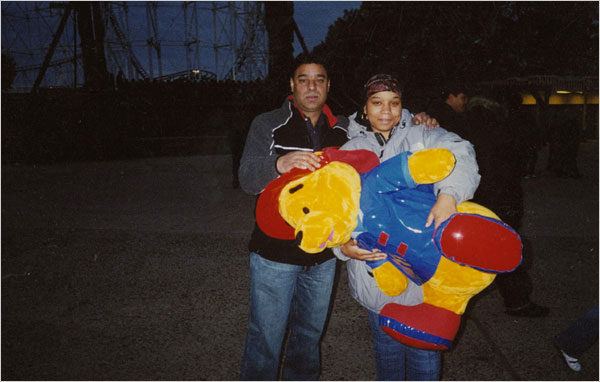Bfgrn
Gold Member
- Apr 4, 2009
- 16,829
- 2,496
- 245
This is shameful; it is NOT the America I was raised to believe in ...
Piecing Together an Immigrants Life the U.S. Refused to See

When the 43-year-old man died in a New Jersey immigration jail in 2005, the very fact seemed to fall into a black hole. Although a fellow inmate scrawled a note telling immigrant advocates that the detainees symptoms of a heart attack had long gone unheeded, government officials would not even confirm that the dead man had existed.
In March, more than three years after the death, federal immigration authorities acknowledged that they had overlooked it, and added a name, Ahmad, Tanveer, to their list of fatalities in custody.
Even as the mans death was retrieved from official oblivion, however, his life remained a mystery, The New York Times reported in an April article on the case that pointed up the secrecy and lack of accountability in the nations ballooning immigration detention system. Just who the man was and why he had been detained were unknown.
Tanveer Ahmad, it turns out, was a longtime New York City cabdriver who had paid thousands of dollars in taxes and immigration application fees. Whether out of love, loneliness or the quest for a green card, he had twice married American women after entering the country on a visitors visa in 1993. His only trouble with the law was a $200 fine for disorderly conduct in 1997: While working at a Houston gas station, he had displayed the businesss unlicensed gun to stop a robbery.
It would come back to haunt him. For if Mr. Ahmads overlooked death showed how immigrants could vanish in detention, his overlooked American life shows how 9/11 changed the stakes for those caught in the nations tangle of immigration laws.
In the end, his body went back in a box to his native village, to be buried by his Pakistani widow and their two children, conceived on his only two trips home in a dozen years. He had always hoped to bring them all to the United States, his widow, Rafia Perveen, said in a tearful telephone interview through a translator.
He said America is very good, she recalled. When it comes to the treatment of Muslims in the U.S., he had faith in the rule of law. He said, In America, they dont bother anyone just for no reason.
Read the whole story
Piecing Together an Immigrants Life the U.S. Refused to See

When the 43-year-old man died in a New Jersey immigration jail in 2005, the very fact seemed to fall into a black hole. Although a fellow inmate scrawled a note telling immigrant advocates that the detainees symptoms of a heart attack had long gone unheeded, government officials would not even confirm that the dead man had existed.
In March, more than three years after the death, federal immigration authorities acknowledged that they had overlooked it, and added a name, Ahmad, Tanveer, to their list of fatalities in custody.
Even as the mans death was retrieved from official oblivion, however, his life remained a mystery, The New York Times reported in an April article on the case that pointed up the secrecy and lack of accountability in the nations ballooning immigration detention system. Just who the man was and why he had been detained were unknown.
Tanveer Ahmad, it turns out, was a longtime New York City cabdriver who had paid thousands of dollars in taxes and immigration application fees. Whether out of love, loneliness or the quest for a green card, he had twice married American women after entering the country on a visitors visa in 1993. His only trouble with the law was a $200 fine for disorderly conduct in 1997: While working at a Houston gas station, he had displayed the businesss unlicensed gun to stop a robbery.
It would come back to haunt him. For if Mr. Ahmads overlooked death showed how immigrants could vanish in detention, his overlooked American life shows how 9/11 changed the stakes for those caught in the nations tangle of immigration laws.
In the end, his body went back in a box to his native village, to be buried by his Pakistani widow and their two children, conceived on his only two trips home in a dozen years. He had always hoped to bring them all to the United States, his widow, Rafia Perveen, said in a tearful telephone interview through a translator.
He said America is very good, she recalled. When it comes to the treatment of Muslims in the U.S., he had faith in the rule of law. He said, In America, they dont bother anyone just for no reason.
Read the whole story


